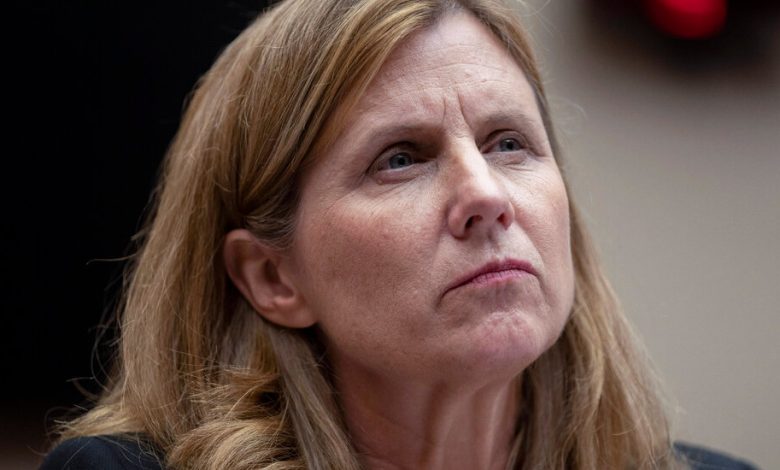The Fallout From the College Presidents’ Antisemitism Testimony

More from our inbox:
- The Homeless Problem Persists on the Subway
- Jewish Women Playwrights
- The Rare Hardship of a Rare Name

The University of Pennsylvania’s president, M. Elizabeth Magill, during a hearing of the House Committee on Education on Capitol Hill on Tuesday.Credit…Mark Schiefelbein/Associated Press
To the Editor:
Re “Penn’s President Felled by Furor Over Testimony” (front page, Dec. 10):
I too was not happy with M. Elizabeth Magill’s and the other university presidents’ responses at the congressional hearing about antisemitism on campus, but I do not support resignation or firing. Everyone in a difficult job has made mistakes and has learned from those mistakes. Should any of us be fired or forced to resign for every mistake we make?
All of these accomplished women were grilled at the hearing trying to balance their duties to protect the safety of their students and their right to free speech. Even the Supreme Court struggles with the same issue.
Yes, their answers at the time were inadequate, but they have subsequently explained their thinking and plans to move forward. They deserved an opportunity to get it right. We would expect the same for ourselves.
Kenneth Olshansky
San Rafael, Calif.
To the Editor:
There is no place, any time, anywhere that calling for the genocide of any group of people is acceptable. Full stop.
Lynn Bernstein
Brooklyn
To the Editor:
M. Elizabeth Magill’s basic point — that her university’s penalty for hateful speech depends on the specific facts — was both thoughtful and appropriate. But the answer can’t be viewed in isolation.
The question wasn’t asked, but it seems unimaginable that Ms. Magill (or the other two college presidents) before that House committee would have shown such nuanced equivocation if the question was whether a student would be disciplined for advocating the genocide of, say, Black people or Native Americans or homosexuals.
I suspect that much of the furor is because their carefully rehearsed answers suggest a troubling campus double standard: a protective one for many traditionally oppressed groups — and a different standard for Jews.
Greg Schwed
New York
The writer is a lawyer.
To the Editor:
Re “University Presidents Walked Into a Trap,” by Michelle Goldberg (column, Dec. 10):
Ms. Goldberg’s thoughtful commentary regarding the testimony of the three university presidents before Congress unfortunately misses the point.
Yes, freedom of speech and debate is essential and must be protected. However, when hateful speech becomes conduct is not the proper test for triggering discipline.
Freedom of speech ends where it becomes bullying, intimidation or incitement, or where it puts people in fear of bodily harm or suppresses the speech of others. It certainly ends where a reasonable listener can interpret it as a call to commit horrific crimes such as genocide.
There has been far too much hypocrisy, including the selective enforcement of rules. This is where the university presidents and the institutions they lead fall short. Whether in the academy or on the street, individuals must learn how to permit and debate any side of an issue without crossing the line into hate speech.
Young people and many others don’t understand this because our educators have failed to teach them how to do so — a task that is essential to a healthy society.
William Titelman
Athens
The writer is a retired lawyer.
To the Editor:
I think that university administrators across the country are abdicating their role to educate students. Under the guise of free speech, they are missing the point. Rather than simply protecting a student’s right to speak freely, they should be making sure that students are educated on the issues.
As a professor at Kent State University, I have more than once encountered students who rally and hold film screenings without a full understanding of what they were fighting for and against, nor the implications of their positions both here and abroad. I have seen that when given the benefit of knowledge, students have changed course and reconsidered their actions.
By sitting back and asserting free speech above all, administrators are missing the opportunity to engage students in their own education, and failing the very students they are working so hard to protect.
Becky Rolnick-Fox
Akron, Ohio
The Homeless Problem Persists on the Subway
To the Editor:
Re “Adams Says City Is Seeing Results in Its Effort to Get Help to the Mentally Ill” (news article, Nov. 30):
As someone who rides the subway frequently, I have a hard time aligning Mayor Eric Adams’s optimism about the progress the city is making in helping the homeless with the scenes that continue to play out in New York underground.
The same huddled figures try to find sleep on the wooden benches, their belongings stuffed into plastic garbage bags — all that’s left of their lives. And in the subway, my fellow passengers and I pray that the person who just entered the car shouting, “I don’t want to harm anyone — I just need some money!” will, in fact, do no harm.
And no one seems to notice that there is still scant visible police presence to monitor and protect the homeless as well as ourselves. For straphangers, there is just a numbing acceptance that we need to avert our eyes from the suffering as we continue to our destination.
Cathy Bernard
New York
Jewish Women Playwrights
To the Editor:
Re “Let Us Tell You a Story: What Would American Theater Be Without Its Jewish Actors, Playwrights and Directors?” (T Magazine, Dec. 3):
While there is much to admire in this fascinating piece, it is disturbing that Jesse Green doesn’t write about or even mention any Jewish women playwrights.
The article reinforces the pervasive erasure of women writers in the theater industry, while lauding the usual suspects. Yes, Arthur Miller, Lerner and Loewe, Neil Simon and Tom Stoppard must be included in this story. So should the female Jewish playwrights, lyricists and librettists who built and continue to build the American theater.
The article overlooks a century of Jewish women theater writers, including Edna Ferber (“Dinner at Eight,” 1932); Lillian Hellman (“The Children’s Hour,” 1934); Betty Comden (“On the Town,” 1944); Dorothy Fields (“Annie Get Your Gun,” 1946); Bella Spewack (“Kiss Me, Kate,” 1948); Susan Yankowitz (“Terminal,” 1969); Liz Swados (“Runaways,” 1978); Wendy Wasserstein (“The Heidi Chronicles,” 1988); Paula Vogel (“How I Learned to Drive,” 1997); Lynn Ahrens (“Ragtime,” 1998); Winnie Holzman (“Wicked,” 2003); and Lisa Kron (“Fun Home,” 2013), to name just a few. It also ignores countless Jewish women playwrights and musical theater writers who are today redefining American theater.
Alice Eve Cohen
New York
The writer is a playwright whose “Oklahoma Samovar” won the National Jewish Playwriting Contest.
The Rare Hardship of a Rare Name
To the Editor:
Re “An Unusual Name Can Be a Burden. In Japan, Parents Are Being Reined In” (news article, Dec. 3):
This article discussed how Japan is trying to limit the prevalence of unusual baby names. There is good reason to do so. As a psychiatrist, I have met many patients who found that having an unusual name was a real social impediment throughout their lives.
Iceland has a good solution to this problem: It gives all parents six months to choose their baby’s name. This allows them time to consider the consequences of choosing a name that could later make their child an object of ridicule or pity. It also results in many colorful ways to refer to a newborn (some of which are a bit salty), since the child may be officially nameless for the first six months. (Icelandic law actually forbids names that may cause embarrassment.)
Harvey M. Berman
White Plains, N.Y.




